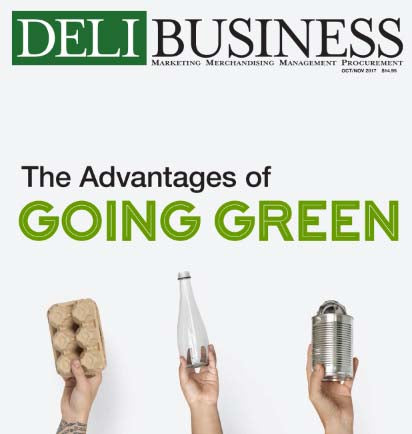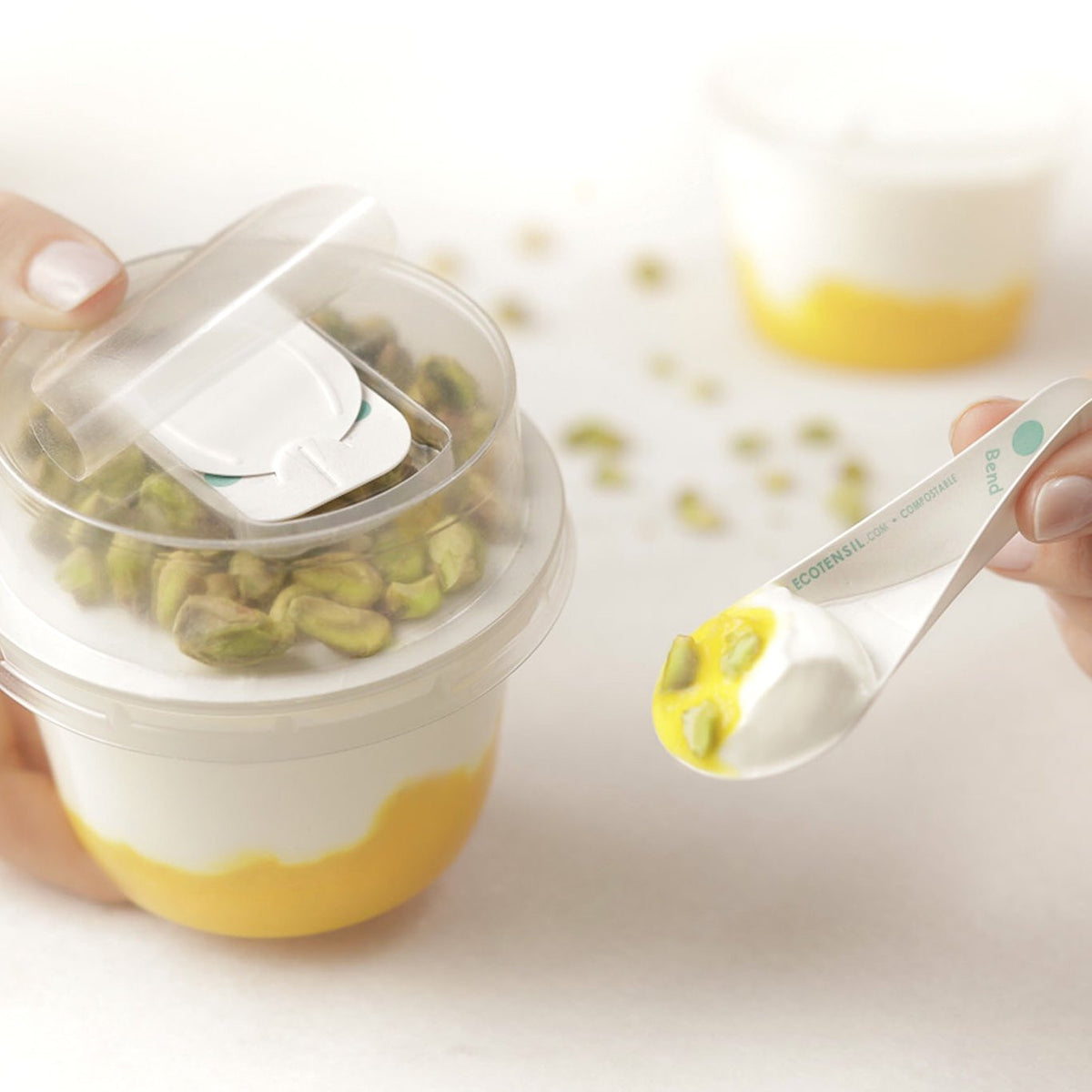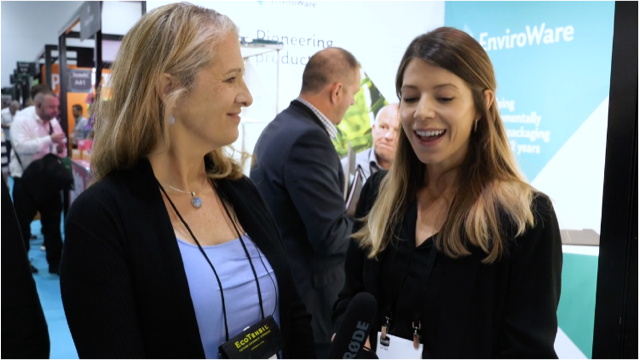The Advantages of GOING GREEN via DELI Business

From DELI BUSINESS: A look at how sustainability and earth-friendly measures are affecting the deli space by Keith Loria
Awareness of the conservation of the world's resources has grown exponentially in the last few decades and continues to pervade the thoughts and actions of people globally. As this mindfulness continues to increase, so will practices and methodologies to increase conservation throughout the business world.
"The deli industry must respond to consumers demanding greater transparency, simpler products with fewer artificial additives taking sustainable/ethical sourcing to the next level," says Tara Sands, fresh marketing promotions manager for KeHE Distributors, LLC, based in Naperville, IL. "Consumers, Millennials in particular, want to do their part to save the planet by purchasing items packaged with recycled materials and demanding ethically produced products from companies." Monterrey/KeHE's Fresh Solution has made a strong commitment to be environmentally conscious and consistently executes on its sustainability goals with projects like energy-efficient LED lighting retrofits, Ecobee smart thermostats and a company-wide recycling and repurposing program, which includes soft plastic recovery. When it comes to sustainability practices, Francis Plowman, cheese narrator and director of marketing for Rogue Creamery, headquartered in Central Point, OR, says the company takes the approach that it can make an impact within the company, industry, town, county and state. In fact, the company's owner/ president David Gremmels, serves on the Oregon Sustainability Board, which encourages activities that best sustain, protect and enhance the environment, economy and community for the present and future benefit of Oregonians. ent and future benefit of Oregonians. "We try to set the best example possible of a socially responsible and community-oriented business," says Plowman. "Our cheese is made using traditional environmentally friendly practices. Sustainable agriculture integrates three main goals: environmental health, animal welfare and social and economic equity. Stewardship of natural, environmental, herd and human resources is of prime importance in a sustainable organization." Reducing plastic waste reduction, using more sustainable (compostable ware) materials, while balancing the needs of the grab-and-go Millennial generation, are just some of the ways in which companies dealing in the deli space can do their part to help. Peggy Cross, CEO/founder of EcoTensil, based in Corte Madera, CA, says its eco-friendly utensils replace plastic, which are used for a few minutes, then will languish in landfill and oceans likely through the year 3000. "EcoTasters use half the amount of material, are made from renewable resources and are fully compostable," she says. "We're focused on helping to reduce one-taste plastic waste at delis for in-store/ sampling and demos, at farmers' markets, county fairs, and at other food sampling, tasting and eating events." Rogue Creamery has pledged to be a zero-impact food producer by 2021 and has done a great deal to honor this commitment. It has achieved a 50 percent waste reduction over the last 10 years through its "Reduce, Reuse, Recycle" program; provided more than 55 percent of its energy needs through solar installations and has two more solar projects in the planning stages; it recycles 100 percent of its whey; and uses no synthetic fertilizers or pesticides on the pastures at its dairy farm. It also rewards employees if they can get to work using any mode of transportation that gets 50 mpg or more. Over half of its team members are participants in the Nellie Green Pedal Power commuter program, which was created by the company in 2009 in partnership with a local brewing company. Members are offered a monthly incentive if they bike, walk, carpool, use public transportation or utilize a vehicle getting 50 mpg or greater commuting to work. With these transport modes, they must make 45 round trips during a oneyear time period. "We have inspired many other companies to develop their own bike commute programs by sharing our templates and contracts, which include Rogue Ales, Rogue Credit Union, Cowgirl Creamery and Vermont Creamery," says Plowman. Peggy Cross, CEO/founder of ecotensil, based in Corte Madera, CA, says its eco-friendly utensils replace plastic, which are used for a few minutes, then will languish in landfill and oceans likely through the year 3000. "EcoTasters use half the amount of material, are made from renewable resources and are fully compostable," she says. "We're focused on helping to reduce one-taste plastic waste at delis for in-store/ sampling and demos, at farmers' markets, county fairs, and at other food sampling, tasting and eating events." Rogue Creamery has pledged to be a zero-impact food producer by 2021 and has done a great deal to honor this commitment. It has achieved a 50 percent waste reduction over the last 10 years through its "Reduce, Reuse, Recycle" program; provided more than 55 percent of its energy needs through solar installations and has two more solar projects in the planning stages; it recycles 100 percent of its whey; and uses no synthetic fertilizers or pesticides on the pastures at its dairy farm. It also rewards employees if they can get to work using any mode of transportation that gets 50 mpg or more. Over half of its team members are participants in the Nellie Green Pedal Power commuter program, which was created by the company in 2009 in partnership with a local brewing company. Members are offered a monthly incentive if they bike, walk, carpool, use public transportation or utilize a vehicle getting 50 mpg or greater commuting to work. With these transport modes, they must make 45 round trips during a one year time period. "We have inspired many other companies to develop their own bike commute programs by sharing our templates and contracts, which include Rogue Ales, Rogue Credit Union, Cowgirl Creamery and Vermont Creamery," says Plowman. Packaging Matters Steve Olk, college category manager and U.S. rep for Planglow, headquartered in the UK, says that with reports of oil running out and estimates suggesting there are around 50 years left at current levels of usage, it is unsustainable in the long term. "Plastics and other oil-based materials take decades, if not centuries (depending on the item), to break down in a landfill. Oil-based plastic packaging is widely used across all industries, and the deli industry is no different," he says. "For some products—such as imported goods and perishables—it is often the only option, but there are many areas where oil-based plastics can be avoided, and a growing number of alternatives are being brought to market to support a more earth-kind approach." The company avoids oil-based plastics wherever it can, so packaging is made from entirely compostable, oil-free materials. "Even our laminate film, which protects from leaks and seeps and forms the clear-viewing windows, is made from a compostable, plant-based film," says Olk. "The laminate is derived from renewable plants and is fully certified to the European (EN13432) and American (ASTM D6400) norms for compostable packaging by Vincotte, Din Certco and BPI as well as being certified for home composting." Olk notes that paper or card board is widely used for packaging, labeling, POS and other display items and, while this can be a very eco-friendly choice, the paper stock needs to be sourced from sustainably-managed forests. "As an organization, we have a policy of only sourcing paper-based products from sustainable and renewable plantations," he says. "We use PEFC (Programme for the Endorsement of Forest Certification) certified paper or FSC (Forest Stewardship Council) stock, with which international non-governmental organizations ensure forests are managed environmentally, socially and economically." Cross says it will be beneficial to delis to let consumers know about their great green efforts via labeling and packaging and also things like signage for compost, landfill and recycle bins. "There's a halo effect when supermarket delis offer compostable utensils and other items," she says. "We're starting to see more labeling in the deli highlighting compostable, organic, non-GMO, gluten-free, etc. This shows the deli cares about their consumer/customer by providing what they are looking for."
Waste Not
Most food waste can be redirected from landfills, and many providers are taking action to do just that. Some of the most common and effective methods include monitoring portions and stock levels to avoid over producing or over purchasing; boxing up leftovers for customers to take away; repurposing peelings and off-cuts, where appropriate; and discounting stock close to expiring. "Where food waste is unavoidable, we would recommend composting the scraps, along with our packaging and labeling postuse; the end-product may then be used to help grow more crops," says Plangllow's Olk. "Our packaging can also be shredded to speed up biodegradation and added to home composters." KeHE's Sands notes that from a food distributor's perspective, proper transport and storage are vital for decreasing the amount of food waste. "If refrigerated items are delivered and then sit on a loading dock for eight hours, shelf life has been greatly reduced," she says. "It is imperative that foods are in their proper temperature zone during every step of the supply chain." A perfect example of this in the deli department is cheese. Delivering the right assortment and amount of cheese for each particular store is vital. Also, recent innovations in packaging are dramatically increasing shelf life. "Consider Bitchin' Sauce, one of our favorite items," says Sands. "This almondbased hummus manufacturer switched to an HPP (High Pressure Processing), [a cold pasteurization technique], improving their shelf life and decreasing shrink or the chance of ending up in a landfill." Ecotensil's Cross says there's lots more compostable and sustainable materials available out there, and companies need to make sure this all goes through the complete cycle of composting. "Composting is key in the deli space," she says. "There needs to be involvement with the municipalities to promote composting within retail businesses. In the U.S., there is a positive, ever-growing awareness and concern about the incredible pace at which we are going through our limited resources. At this time, that movement of our culture in this direction is challenged by a convenience-based lifestyle." Cross believes continued education of consumers and companies is needed by business, government and non-governmental organizations to make people aware of the problems of excessive wasteAlso in News

EcoTensil® launches the new AquaDot™ range of plastic-free paperboard cutlery in the EU ahead of single-use plastic ban

EcoTensil launches revolutionary, plastic-free utensils in Europe and UK - Packaging Innovations, Birmingham, UK


